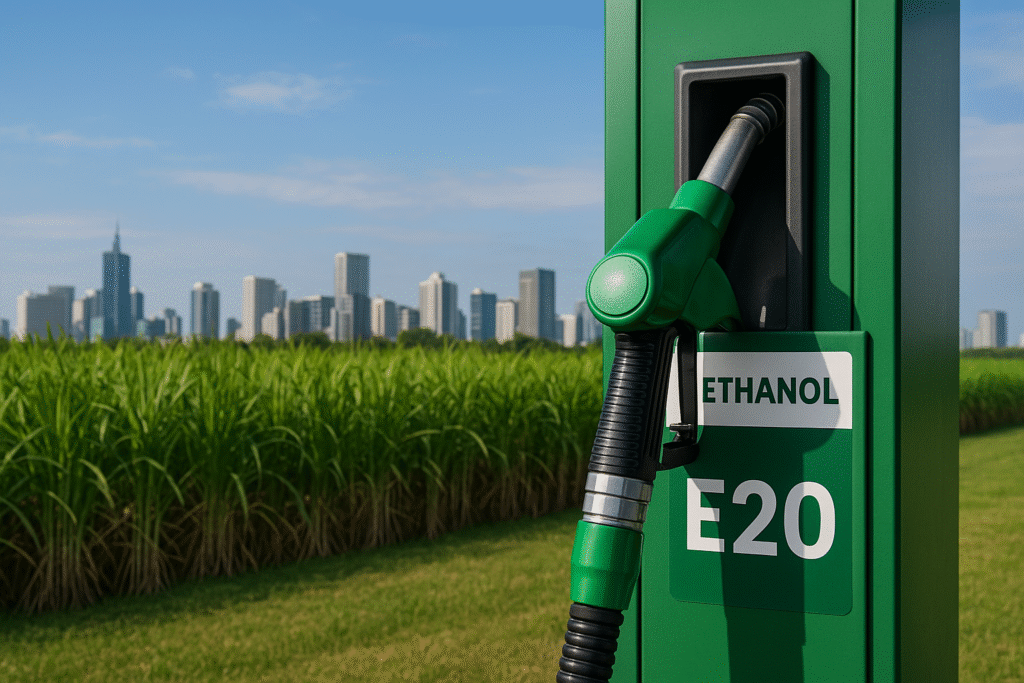Is Ethanol Fuel the Key to a Sustainable Energy Future?
The global energy landscape is rapidly evolving, and countries are seeking cleaner, renewable alternatives to reduce dependence on fossil fuels. Ethanol fuel has emerged as a viable solution, offering a sustainable and environmentally friendly option for transportation. Derived from plant-based sources such as sugarcane and corn, ethanol is increasingly being blended with petrol to reduce carbon emissions and enhance energy security.
In India, the government has set ambitious targets to increase ethanol blending in petrol, aiming to support domestic agriculture, reduce fuel imports, and contribute to climate change mitigation. This article explores the production, benefits, challenges, and future prospects of ethanol fuel, providing a comprehensive understanding for policymakers, industry stakeholders, and environmentally conscious consumers.
What is Ethanol Fuel?
Ethanol fuel is a renewable biofuel produced by fermenting sugars found in plants such as sugarcane, corn, wheat, and other biomass materials. The resulting ethanol is then blended with petrol to create various fuel grades, such as E10, E20, and E85.
Key Production Steps:
- Fermentation: Plant sugars are converted into ethanol using yeast.
- Distillation: Ethanol is separated from the fermentation mixture through heating.
- Dehydration & Blending: Water is removed to produce anhydrous ethanol, which is then blended with petrol to achieve the desired fuel ratio.
The production of ethanol fuel not only provides a renewable energy source but also creates new market opportunities for farmers, boosting the agricultural economy.
The Rise of Ethanol in India
India has prioritized ethanol blending as part of its national energy strategy. The government aims to achieve 20% ethanol blending (E20) by 2025 and 30% by 2030. This initiative aligns with India’s commitments under the Paris Agreement to reduce carbon emissions and promote renewable energy.
To support this, India has invested in production facilities and established policies to encourage farmers to grow crops suitable for ethanol production. This not only addresses energy security but also generates rural employment and strengthens the agricultural sector.
While the transition to higher ethanol blends presents many benefits, it also brings challenges. Some vehicle owners have expressed concerns about reduced fuel efficiency with E20. Automakers report a 2%-4% decrease in mileage but confirm that the fuel is compatible with modern engines and does not void warranties .
Advantages of Ethanol Fuel
Ethanol fuel offers a range of environmental, economic, and social benefits.
1. Environmental Benefits:
- Ethanol burns cleaner than conventional petrol, producing fewer greenhouse gases and pollutants.
- Adoption of ethanol fuel contributes to improved air quality and reduced climate impact.
2. Energy Security:
- Ethanol production reduces India’s reliance on imported oil, saving foreign exchange and strengthening energy independence.
3. Support for Agriculture:
- Farmers benefit from increased demand for crops such as sugarcane and corn.
- Ethanol production provides a stable source of income, reducing vulnerability to market fluctuations in traditional crop markets.
4. Economic Growth:
- The ethanol industry generates jobs in agriculture, production, transportation, and distribution.
- Encourages investments in renewable energy infrastructure, creating long-term economic benefits.
5. Engine Performance:
- Ethanol has a higher octane rating than petrol, improving engine efficiency in compatible vehicles.
Challenges and Considerations
Despite its advantages, ethanol fuel has limitations and requires careful planning for widespread adoption.
1. Vehicle Compatibility:
- Older vehicles may not be designed to handle high ethanol blends, potentially causing engine issues.
- Owners should consult manufacturer guidelines and consider modifications if necessary.
2. Fuel Efficiency:
- E20 may reduce mileage slightly due to the lower energy density of ethanol.
- While this is a minor trade-off, the broader environmental and economic benefits often outweigh the efficiency loss.
3. Infrastructure Requirements:
- Ethanol requires specialized storage and transportation systems.
- Investments are needed to prevent pipeline corrosion and ensure safe distribution.
4. Food vs. Fuel Debate:
- Using food crops for fuel production can raise concerns about food security.
- Innovations like cellulosic ethanol, which uses non-food plant material, help address this challenge.
Global Perspective on Ethanol Fuel
Brazil:
- Brazil is a global leader in ethanol production using sugarcane.
- Mandatory ethanol blending and flex-fuel vehicles have created a robust market.
United States:
- Corn-based ethanol is widely used with E10 and E85 fuels.
- Policies such as the Renewable Fuel Standard promote biofuel adoption and greenhouse gas reduction.
India:
- The government promotes ethanol blending to reduce oil imports and support farmers.
- The Ethanol Blended Petrol program is expanding nationwide to achieve 20%-30% blending targets.
Other Countries:
- Europe and Asian nations are exploring ethanol as part of broader biofuel initiatives, including hybrid and renewable energy integration.
FAQs About Ethanol Fuel
Q1: Is E20 fuel safe for all vehicles?
A1: E20 is safe for modern vehicles designed to handle higher ethanol blends. Older vehicles may require modifications.
Q2: Does ethanol fuel affect my vehicle warranty?
A2: Using E20 fuel does not void warranties if the vehicle is compatible with the blend.
Q3: Will ethanol fuel reduce mileage?
A3: Slightly, around 2%-4% lower than petrol, but the environmental and economic benefits compensate for this.
Q4: Can ethanol fuel impact food prices?
A4: Potentially, if food crops are used extensively for fuel. However, non-food biomass solutions like cellulosic ethanol mitigate this risk.
Q5: How is ethanol produced from plants?
A5: Through fermentation of plant sugars, distillation to purify ethanol, and blending with petrol to create the fuel mix.
Conclusion: Driving Towards a Sustainable Future
Ethanol fuel represents a critical step in the transition toward sustainable and renewable energy sources. Its adoption in India not only strengthens energy security but also promotes agricultural growth and reduces carbon emissions. While challenges like vehicle compatibility and infrastructure development exist, the long-term benefits make ethanol fuel a strategic choice for a greener future.
Every action counts. Choosing ethanol-blended fuel is more than just filling your tank; it is a contribution to environmental protection, economic growth, and energy independence.
We highly value your feedback. Have you used ethanol-blended fuels or experienced any challenges? Share your thoughts in the comments below. Your insights help us improve and serve you better. Together, we can accelerate India’s journey toward a sustainable energy future.
The future is clean, renewable, and sustainable—just like the fuel we choose.
Sources –
US Renewable Fuel Standard: https://www.epa.gov/renewable-fuel-standard-program
Government of India Ethanol Blended Petrol program: https://www.mea.gov.in
Reuters article on ethanol in India: https://www.reuters.com/sustainability/climate-energy/
Brazil ethanol industry insights: https://www.ibge.gov.br
Read our blog on Ather Redux Concept – https://newsarmour.com/ather-redux-concept-a-glimpse-into-the-future-of-electric-riding/






